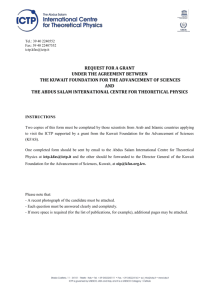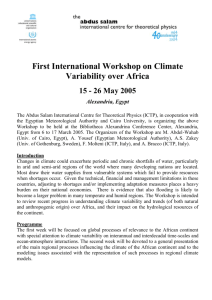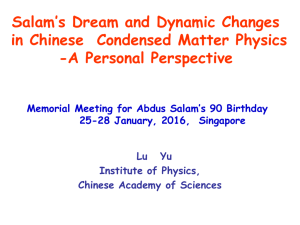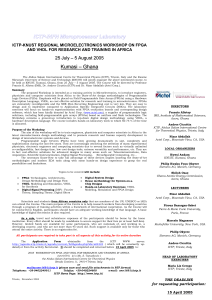Professor Abdus Salam, my Teacher and Mentor: The Role of ICTP
advertisement
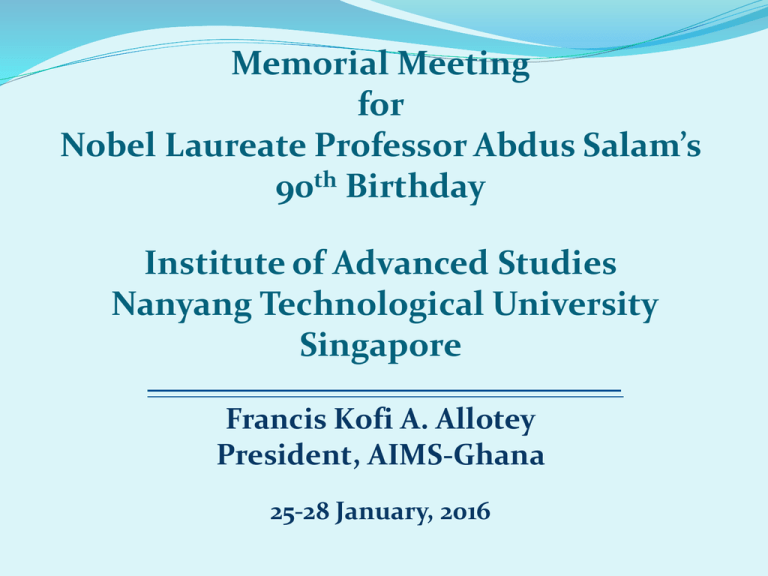
Memorial Meeting for Nobel Laureate Professor Abdus Salam’s 90th Birthday Institute of Advanced Studies Nanyang Technological University Singapore Francis Kofi A. Allotey President, AIMS-Ghana 25-28 January, 2016 Nobel Laureate Prof. Abdus Salam, 1926-1996 The presentation will be treated in the following way; I. Prof. Salam, Mentor and Teacher II. Prof. Salam, ICTP and Development of Physics and Mathematics in Africa III. Prof. Salam, a candidate for the post of Director General of UNESCO IV. Epilogue 3 Prof. Salam, Mentor and Teacher Met Prof. Salam in 1959 at Imperial College as a graduate student, Department of mathematics then located at the Huxley Building, South Kensington. 25 years Staff Loyal Service Celebration, ICTP, Trieste. 4 He was Prof. of Applied Mathematics and Head of Applied Mathematics Section of the Department of Mathematics. I attended his lectures on Group Theory and Fundamental Particle Physics. It was a very popular course for almost all postgraduate students and young lecturers in Theoretical Physics at the various Colleges in the University of London. Brilliant and insightful lecture and contained many new ideas particularly his classification of the known fundamental particles using group theoretical methods. 5 Confident and inspiring and always wore black gown. Used the largest auditorium. Always full and many students had to stand during his lectures. I was the only African student attending his course. He became interested in my academic work and welfare. His wife invited my wife several times for afternoon tea in their home. Religious and a devoted Muslim. His uncle was a pioneer Ahamadiyya missionary in Ghana, specifically in the town where I was born and grew up. 6 However, Prof. Salam did not discuss his religious beliefs with his students, colleagues and employees. Very kind and a philanthropist and spent his fund assisting some high schools in Africa. 1960’s Prof. Salam sent one of his graduate student from Pakistan to teach physics and mathematics in a high school in Ghana for 1 year before commencing his Ph.D at Imperial College. He and Professor Harry Jones, the Head of Mathematics Department at Imperial College gave me references when I decided to go to Princeton University for my Ph.D. 7 Prof. Salam wrote to me in 1967 that he was initiating a new programme And wanted me to participate in the Condensed Matter Physics programme at ICTP that he had established in 1964. And since 1967, I have been visiting ICTP regularly without a break as: Participant, Associate and Senior Associate, Course Director and since 1996, member of the ICTP Scientific Council. 1992 nominated me to represent him on the Scientific Council of the International Institute for Theoretical and Applied Physics at the Iowa State University Established on the model of the ICTP. 8 Prof. Salam, ICTP and Development of Physics and Mathematics in Africa ICTP, first institution to play a crucial role in positively developing Physics in Africa through human capacity development in various areas of physics and mathematics. Helped African scientists keep active in research while staying in their home countries. Every year, about 6000 scientists visit ICTP for advanced training and research, about 600 of them are from Africa. ICTP organizes several training courses, workshops and conferences in Africa. ICTP also has programmes like TRIL and STEP. 9 In the STEP programme, a student who has registered for a PhD in a developing country is chosen for three visits to ICTP for a total of about 18 months, usually having a co-advisor in ICTP or in any ICTP-affiliated institution. The students receive their PhD from their home institutions. STEP is to minimize brain drain while providing opportunity for collaboration and access to top facilities. ICTP has several affiliated centres and projects in Africa and has helped train several senior African physicists mathematicians holding important positions in Africa. and In each region in Africa, one can find associates and former associates of the centre. They design the scientific policy of their countries and many hold important academic and research positions. 10 There are associates who have become ministers or secretaries in scientific affairs and presidents of universities. Almost all presidents of physical societies in Africa have been associated with ICTP. The immediate past Commissioner for Science and Technology of the African Union was an ICTP associate and a former director of ICTP-affiliated center in his home country, the Republic of Benin. 11 Formation of a society for African Physicists originated at ICTP on 26th August 1983, when thirty-five African scientists, visiting ICTP from various parts of Africa, held a meeting and resolved to form the Society of African Physicists and Mathematicians (SAPAM) out of the following concerns for: The state of physics and mathematics in Africa, Lack of cohesion and functional links among African scientists, Great scientific and technological gap between the industrialized and developing countries particularly in Africa, and Aware that mathematics and physics are the basis for the creation of modern industries. 12 • SAPAM received an overwhelming support from Prof. Salam and he agreed to host the formal inaugural meeting at ICTP in October 1984 during ICTP’s 20thAnniversay Celebration. •During the inauguration, a pan-African Symposium on the “State of Physics and Mathematics in Africa” was organized under the patronage of Prof. Salam with me as Chairman of the planning committee. 13 Dr. G. Andreotti, then Italian Foreign Minister and former Prime Minister of Italy attended the inaugural meeting. He stressed the importance of science, technology and innovation for sustainable economic development and he was happy about the inauguration of SAPAM. gghgfg 14 He said and here I quote “…the populations affected by food and health problems must be helped, but they must also face these problems within a wider context, which would give them the tools for an autonomous development. “Thus there is (besides the immediate direct help) another kind of help nonetheless essential from the point of our civil responsibility: the formation of researchers, technicians and experts whose competence is the base of the economic development of less developed countries and will ensure the good use of long term investments prerequisite for any civic progress.” 15 Dr. Andreotti substantially increased the amount requested by Professor Salam from the Italian government for the ICTP and this enabled ICTP to establish Office of External Activity (OEA) and The World Academy of Sciences (TWAS). He asked other development partners and donor agencies to assist Africa in the area of Science, Technology and Innovation. gghgfg 16 Among the problems contributing to the poor state of physics and mathematics in Africa were inadequate student numbers, shortage of teachers, lack of critical mass for an effective research, poor experimental facilities, a shortage of text books and journals and inadequate interactions among African mathematicians and physicists and with the rest of the world. A strategy for solving these problems was discussed and adopted for implementation. Prof. Salam took active part in the deliberations. ICTP support and encouragement from Professor Salam, SAPAM organized in 1986, a Pan African workshop in Nairobi, Kenya on harmonization of curriculum in physics, mathematics and computer science at the tertiary level of education in Africa. 17 First of its kind in Africa. Training in the production of low-cost scientific equipment for education in science in Africa was initiated. In 1987, SAPAM initiated the APEPMA (Applicability of Environmental Physics and Meteorology in Africa) series of workshops to sensitize the physical science community and African policy makers on issues related to climate and the environment. The first workshop took place in Addis Ababa, Ethiopia, at the time when that part of Africa experienced one of the most devastating droughts of the 20th century. SAPAM had been organizing African Regional College on Renewable Energy known as the “Kumasi College on Renewal Energy” since 1986 in Ghana. 18 Some of the participants at these workshops have held and some are still holding positions such as ministers in charge of energy, members of energy commissions, researchers and teachers in energy studies, technology and innovation in their countries. With the collaboration of ICTP, SAPAM achieved great successes by organizing conferences and workshops, building links amongst physicists working in Africa and building links with physicists worldwide and organizing public engagements. SAPAM played a leading role in Africa during the celebration of the year 2005 as an International Year of Physics. African Union (AU) granted the society an observer status. Relative success of SAPAM led to the formation of Edward Bouchet Institute in 1988 at ICTP on the suggestion from Prof. Salam. 19 After his death in 1996, it was renamed Edward Bouchet Abdus Salam Institute (EBASI), which is an USA-AfricaICTP initiative. 1st African Physical Society (AfPS) Council Meeting, Dakar, January 2010 20 EBASI provides: mechanisms for synergistic and technical collaborations between Africa, African diaspora and American physicists, scientists, engineers and technologists. Aim of this is the enhancement of the impact of science and technology on sustainable development of the countries on the African continent. And also to increase the technical manpower pool working in Africa by facilitating the training of PhD students from African Universities. EBASI periodically organizes international scientific and technical conferences, workshops and topical meetings which are hosted by Universities in many African countries. 21 These conferences promote collaborations between American and African Physicists, Scientists, engineers and technologists and tremendously enhance the quality of African Universities that hosts them. EBASI which has been a very successful initiative has resulted in the training of a number of African graduate students, exchange of Professors from African and American Universities and the provision of scientific equipment. At the 6th EBASI meeting and general assembly of SAPAM attended by over 200 physicists from all over Africa on 24th January, 2007 at iThemba Laboratory, Cape Town, South Africa, it was resolved that SAPAM should be transformed and be known as the African Physical Society (AfPS). 22 A professional society was needed to become an advocate for Physics and physicists at the African Union, in governments of the 54 African countries, amongst the Universities, research institutions and corporate bodies, schools and in the African general public; a society that organizes meetings, conducts professional developmental workshops, suggests standard of professional conduct and provides information and does all the things that professional associations do. Presidents, SIF and AfPS, 45th Anniversary Celebration of ICTP, Treiste, November 2010 23 At the iThemba Laboratory meeting in Cape Town South Africa, the official publication of AfPS known as African Journal of Physics was inaugurated with the editorial office located at ICTP, Trieste, Italy. It is a free on-line peer-reviewed international journal dedicated to publishing in all branches of experimental and theoretical physics with emphasis on originality and relevance to basic understanding of contemporal physics and related interdisciplinary fields. 24 The AfPS was formally launched on the 12th January 2010 under the distinguished patronage of His Excellency, Maitre Abdulaye Wade, then the President of the Republic of Senegal. There were 110 African Physicists from 21 African Countries and all national physical societies in Africa were present. President Wade LAM-N (Laser Atomic Molecular-Network) and AfPS Members with Senegal’s President 25 It is worth mentioning here that the African Physical Society played a leading role through the Government of Ghana for the UNESCO Executive Board to endorse 2015 as the International Year of Light (IYL) and then for the United Nations to proclaim 2015 as International Year of Light and Light based technologies. AfPS has received a request from the International Commission for Acoustics to play a similar leading role in seeking an endorsement from UNESCO for the United Nations to proclaim 2019 as an International Year of Sound. The initiative to establish an African Academy of Sciences (AAS) originated at ICTP in 1985. It was during the inauguration of The World Academy of Sciences (TWAS) when Professor Salam organized Regional meetings for the scientists participating in the inauguration of TWAS. Prof. Salam took part in the African Regional meeting as an observer. It was during the meeting that the idea to form AAS evolved. He gave his strong moral and financial support to make AAS a reality. 26 Prof. Salam, a candidate for the post of Director General of UNESCO With the huge success of ICTP and his strong belief that science was a common human heritage, Prof. Salam wanted to apply the ICTP model to UNESCO, particularly the “S” (Science) part, hence his quest for the post of Director General of UNECSO. Prof Salam wanted to establish ICTP Centers in many developing countries and placed Science, Technology and Innovation (STI) on the high agenda in developing countries. Prof. Salam strongly believed that the development gap between countries in the North and those in the South was basically a manifestation of science and technological gap. 27 Nothing else, neither differential cultural values or differing perception or religious thoughts nor differing systems of economics or governance can explain why the North to the exclusion of the South can master this globe of ours and beyond He made me his campaign manager to vie for African votes. We spent about ten days soliciting votes for him at the UNESCO Headquarters in Paris. Despite the massive support for him from the developing countries, particularly African countries, his country Pakistan refused to endorse his candidature to the UNESCO Executive Board. His candidature was therefore not placed at the General conference for the election to the post of Director General of UNESCO. The Pakistan government rather nominated a retired Army General who eventually lost. 28 EPILOGUE: Professor Abdus Salam would have been very pleased to know that his vision of establishing ICTP centres in developing countries was being realized with the granting by the UNESCO General Conference in November 2015, a UNESCO Category II status to four institutions in Brazil, China, Mexico and Rwanda which will bear the name ICTP. Some years after the death of Professor Salam, while I was attending a Board meeting of International Atomic Energy Agency (IAEA) Board of Governors in Vienna, Austria, (of which Prof. Salam was also a former Governor), Pakistani Official approached me. He informed me that though Pakistan, a Muslim country, does not approve the mounting of human images and busts, it would however, not object if Prof. Salam’s bust would be mounted at IAEA 29 Similar to that of Prof. Homi Bhabha, Prof. Marie Curie- Sklodowska, Prof. Otto Hahn and Prof. Igor Kurchatov. He further informed me that he would ask ICTP to follow it up and that Pakistan would bear the cost involved. 30 At this stage, I wish to apologize for being personal. Through ICTP, I have been able to contribute to physics, mathematics and international science policy and development while still working in Ghana. Since 1967, I have been visiting ICTP regularly without a break as; Participant, Associate, Senior Associate, Course Director and since 1996, as a member of the ICTP Scientific Council. Governor at IAEA, Vice President of International Union of Pure and Applied Physics (IUPAP), President of African Physical Society, Vice President African Academy of Sciences, a co-author, UN Blue Book Series No.1 (1981), Comprehensive Study on Nuclear Weapons. I was a member of 12 experts, “called the 12 wise men” that advised UN on “IAEA Beyond the Year 2000”. 31 In Ghana, I have been Chairman of Ghana Atomic Energy Commission. Pro Vice Chancellor of Kwame Nkrumah University of Science and Technology, President of Ghana Academy of Arts and Sciences, Chairman, Council for Scientific and Industrial Research, and President, AIMS Ghana. I played a leading role through the government of Ghana in the process that led UN to declare 2015, International Year of Light and Light Based Technologies. I am a Chartered Fellow of the British Computer Society and in 2012, the UK Institute of Physics conferred on me an Honorary Fellow. 32 To commemorate my contribution to science, Ghana government issued a postage stamp with my portrait in 2006 33 I am what I am in the world of physics due to Prof. Salam’s mentorship and inspiration of which I am very grateful. Thank You
